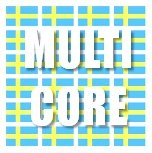Keynotes
Jim Nilsson, Intel: Memory Sharing and The Compute Architecture of Intel® Processor Graphics Gen9 (Skylake)

Abstract
Intel’s on-die integrated processor graphics architecture offers outstanding real time 3D rendering and media performance. However, its underlying compute architecture also offers general purpose compute capabilities that approach teraFLOPS performance. The architecture of Intel processor graphics delivers a full complement of high-throughput floating-point and integer compute capabilities, a layered high bandwidth memory hierarchy, and deep integration with on-die CPUs and other on-die system-on-a-chip (SoC) devices. Moreover, it is a modular architecture that achieves scalability for a family of products that range from cellphones to tablets and laptops, to high end desktops and servers. This talk will present an overview of the Skylake compute architecture, with a focus on its shared memory capabilities.
Bio
Jim Nilsson is a Research Manager in the Advanced Rendering Technology (ART) team at Intel. ART is a research group focusing on improving Intel graphics architectures for the future - with a five to ten year horizon - including, but not limited to, rendering algorithms, 3D/compute/media architecture, ray tracing, and data compression. Jim has PhD in computer architecture from Chalmers University of Technology in Gothenburg, and an MBA from Gothenburg School of Economics & Law. He has been working as an entrepreneur and founded four companies. His personal research interests are memory system architectures, compression, and rendering.
Morten Sleth Rasmussen, ARM: Energy and thermal awareness in OS and middleware

Abstract
Modern mobile SoCs, desktop, and server systems are becoming very high performance but can only sustain the highest performance for short bursts and it is prohibitively expensive in terms of energy consumption. To deliver the best performance at the lowest energy cost, power consumption has to be considered throughout the software stack starting with revisiting OS design decisions in task scheduling and power management. The OS and middleware has to become more aware of the energy implications of their decisions and performance constraints imposed by the thermal budget to achieve this goal. In Linux, OS power management has been around for years, however it is still largely uncoordinated and has not been designed to provide clear and efficient controls to manage the power/performance trade-off. This talk will provide an overview of the challenges in power and thermal management faced by the industry today and some of the solutions developed at ARM making their way into Linux-based systems.
Click here for a copy of the slides.
Bio
Morten Sleth Rasmussen is Staff Software Engineer at ARM in the Systems & Software Group. Since joining ARM in 2010, he has done research and development on OS power management, task scheduling, energy models, and ARM big.LITTLE OS optimizations in Linux. He has been deeply involved in the development of Global Task Scheduling (GTS) for big.LITTLE systems. Morten is currently working on Energy-Aware Scheduling (EAS) and promoting energy-awareness in industry and the Linux community through talks, workshops, and micro-conferences. He has given presentations at several open source conferences including Kernel Summit, Linux Plumbers Conference, and Linaro Connect. Morten received a PhD in Computer Systems Engineering from the Technical University of Denmark (DTU) in 2010, and also holds a MSc in Computer Systems Engineering from the same university.
